The much-awaited list of commissioner nominees has been transmitted to the Niger State House of Assembly by Governor Muhammad Umar Bago for screening and confirmation.
A gender review of the list shows that women remain significantly underrepresented, with only three women nominated out of 30 candidates—representing just 10 per cent. This marks a decline from the previous cabinet, where female representation stood at 16.7 per cent. The figure is also far below Nigeria’s National Gender Policy, which recommends 35 per cent female inclusion in political appointments.
The three women on the new nominees list are Dr. Hadiza Asabe Mohammed (Bida LGA), Ladi Bawa Bosso (Bosso LGA), and Hadiza Idris Kuta (Shiroro LGA).
Women are similarly underrepresented in the Niger State House of Assembly, where only one woman—Afiniki Eunice Dauda of Gurara LGA, who serves as Deputy Speaker and Chairperson of the House Committee on Women and Humanitarian Affairs—was elected in the last general election. This translates to just 3.7 per cent representation among the 27-member legislature.
At the local government level, only one woman, Ladidi Rakiya Bawa Bosso, was elected as a council chairperson in the 2023 LG elections, placing women’s representation at 4 per cent across the state’s 25 LGAs. In the most recent local government elections, no woman was elected chairperson, resulting in a 0 per cent representation rate.
However, history was made in the same election as women were appointed to all 25 vice-chairmanship positions—fulfilling a promise made by Governor Bago and achieving 100 per cent representation in that category.
The governor is also credited with appointing more than 500 women to various positions in the state and has pledged to exceed the 36 per cent Affirmative Action benchmark.
Despite these gains, women’s groups say the low number of female commissioner nominees highlights persistent barriers to women’s political leadership in the state. They argue that women continue to face significant challenges in attaining strategic decision-making roles and that their contributions remain undervalued.
Advocates are calling for deliberate steps to increase women’s participation in governance, including creating more leadership opportunities for women and implementing policies that promote gender equality.
They insist that Niger State has qualified and capable women who possess the leadership skills and political influence required for higher office.
Many believe Governor Bago’s declared ambition of achieving 50 per cent female representation in governance is achievable—beginning with the appointment of at least 10 female commissioners.
This article is written by Maimuna Babangida, a journalist and Lecturer in Minna, Niger state


